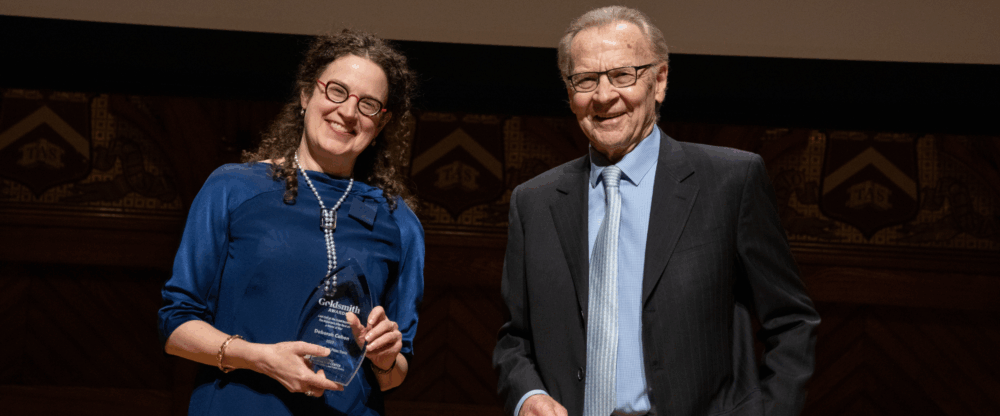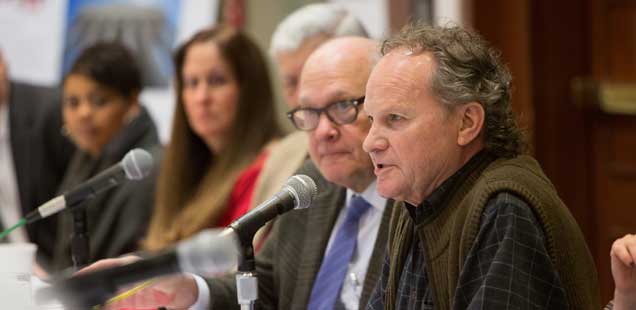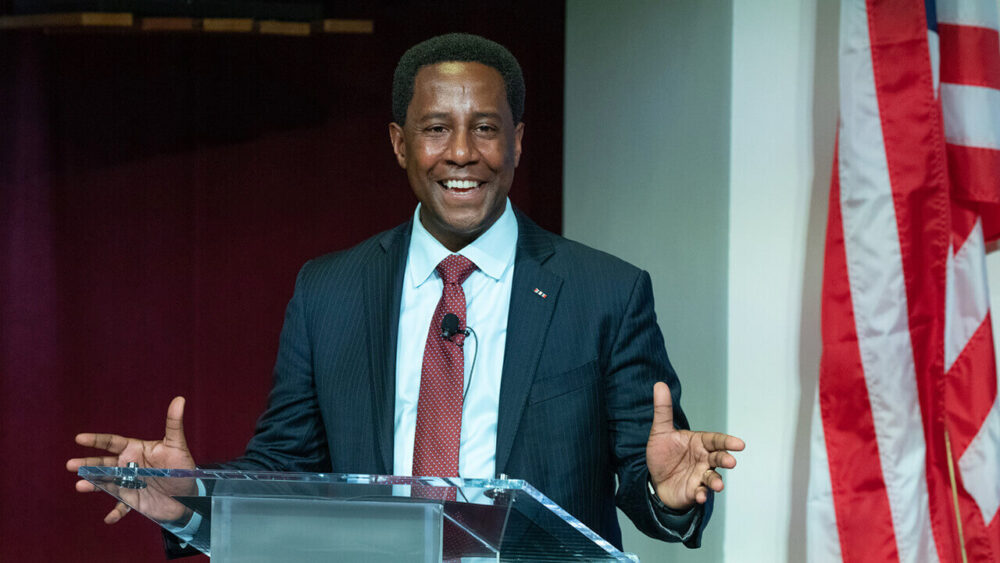
Nominations open for the 2026 Goldsmith Awards
Newsletter

Our weekly roundup of news found at the intersection of media, politics, policy and technology, from the Shorenstein Center and from around the web.
Media and Politics: What’s Next? A Conversation with the Joan Shorenstein Fellows. William E. Buzenberg, former executive director of The Center for Public Integrity, Jackie Calmes, national correspondent for The New York Times, Michele Norris, NPR host and special correspondent, and David Weinberger, senior researcher at Harvard’s Berkman Center discussed topics such as international journalism collaborations, use of APIs at news outlets, the 2016 elections, and race relations. Read a recap and listen to audio.
Goldsmith Prize Finalists, Now Pulitzer Winners, Discuss Their Stories. Two teams that were finalists for the Shorenstein Center’s Goldsmith Prize for Investigative Reporting won Pulitzer Prizes this week. Jennifer Berry Hawes and Doug Pardue of The Post and Courier and John Carreyrou and Christopher Weaver of The Wall Street Journal discussed the making of their winning stories “Till Death Do Us Part” and “Medicare Unmasked,” at the Goldsmith Seminar on Investigative Reporting in March 2015. Watch the video.
Open Data, Government and Citizen Perceptions. Pew Research released a new report, “Americans’ Views on Open Government Data,” based on a first of its kind survey about American attitudes toward government openness projects. View key takeaways on Journalist’s Resource.
Varieties of Civic Engagement in Contemporary America. What activities can be categorized as civic engagement, and what are the trade-offs of various types of civic engagement? Read more on Journalist’s Resource.
Hidden Dangers that Banking Regulators Fail to Chart. Robert Lenzner, Joan Shorenstein Fellow, Spring 2014, writes in Financial Times that seven years after the financial crisis, regulators still know very little about the true level of risk that big banks are exposed to.
How to Bring Clarity and Urgency to Social Security Reporting. Trudy Lieberman, Joan Shorenstein Fellow, Spring 2001, provides tips for how the media can better report on the emerging Social Security debate in Columbia Journalism Review.
The Incredible Jun: A Town that Runs on Social Media. William Powers, Joan Shorenstein Fellow, Fall 2006, writes about the Spanish town of Jun, which has been using Twitter as its principal medium for citizen-government communication. From the Huffington Post.
Rand Paul, Bitcoin and a New Frontier in Campaign Finance Loopholes. Renée Loth, Joan Shorenstein Fellow, Fall 2011, writes on WBUR about Rand Paul being the first presidential candidate to accept Bitcoin donations — and why use of the currency is raising concerns among some federal elections officials.
New Studies on Political Fact-Checking: Growing, Influential; but Less Popular Among GOP Readers, from American Press Institute.
Covering Campaigns, Past, Present—and Future? Politico’s second annual Media Issue explores how politics has been impacted by the web.
White House Press Corps to Members: “It’s Time for Us to Band Together,” from Poynter.
Views of Supreme Court Little Changed as Major Rulings Loom, from Pew Research Center.
10 Most Censored Countries, from the Committee to Protect Journalists.
Is There a “European Public Sphere” Waiting for Politico Europe — or Can it Help Create One? From Nieman Journalism Lab.
U.K. Newspapers Join Forces with Twitter to Host Election Forums, from HoldtheFrontPage.
Why Journalists Should (at Least Sometimes) Be Activists. Dan Gillmor of Arizona State University’s Walter Cronkite School of Journalism and Mass Communication argues that journalists should be advocates for matters of freedom of expression.
Sign up to receive Media and Politics Must Reads in your inbox each week. Also connect with us on Twitter and Facebook for more updates.


Center News

Center News